|
The Steel Nut & Joseph Hampton Limited, of
Woden Works, Franchise Street, in Butcroft, was founded in 1851.
For most of its life the company was in Wednesbury, but in April
1966, under the terms of the Local Government Reform Act,
Wednesbury lost its status as a Municipal Borough, as did
Darlaston. The boundary between the towns changed, so that Kings
Hill, Butcroft, and Fallings Heath, joined Darlaston to become
part of Walsall, which is why I have included the company here.
|
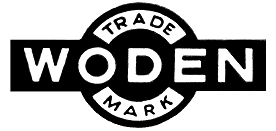 |
| The business was founded by 27 years old Joseph
Hampton, who lived in Franchise Street. He had a tool
making business producing a wide range of products
including carpenters' bench screws, copying presses,
flooring cramps, lifting jacks, pipe wrenches, and
ratchet drill braces. In the 1881 census he is listed as
a tool maker employing twelve men, 6 boys, and a woman.
He lived with his wife Nancy and children Arthur and
Sarah. Joseph's eldest son William lived at number 19
Franchise Street with his wife Mary and children
Charles, Sarah, Thomas, Joseph, William, Rueben, and
Samuel. In the census William is described as a
cramp and tool maker, as is his eldest son Charles. It
seems that in 1897 the firm joined forces with The Steel
Nut Company, also based in Franchise Street, to form The
Steel Nut and Joseph Hampton Limited with its 'Woden'
trade mark. During the following year, William's sons
Charles and Joseph left the family business and moved to
Sheffield where they founded a firm called C & J
Hampton, based at Eagle Foundry, Livingston Road,
Sheffield. They initially produced marlin spikes, and
specialised castings, but by 1908 were making a range of
tools including woodworking vices, pipe vices, pipe
cutters, all kinds of cramps, wrenches, and jacks. The
firm became a limited company in 1908, and in 1909
registered the 'Record' trade mark, which became well
known. The two brothers soon fell out and so Joseph
returned to Wednesbury, leaving Charles to run the
business alone. He was soon joined by his two sons
Horace and Charles, and the business went from strength to
strength.
|
|
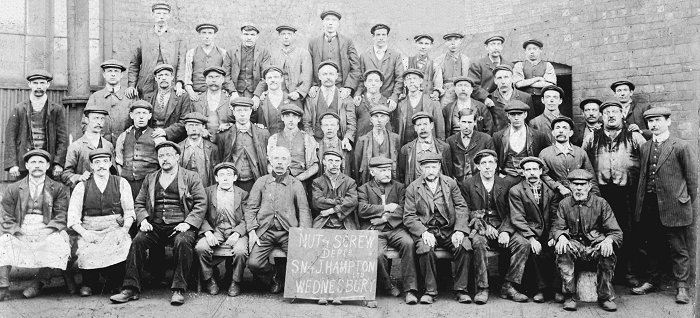
A group of workers, date unknown.
Courtesy of John & Christine Ashmore. |
| Back in Wednesbury a number of patents were taken out
for tools, and it seems that members of the family also
briefly produced cycles at the Hampton and Hampton Cycle
Works in Franchise Street, which is listed in the
circular directory in the 1901 edition of Ryder's
Annual. The factory initially covered a small area
on the northern side of Franchise Street, and slowly grew to
cover a large area of derelict land to the north, which extended
to the end of All Saints Road, off Walsall Road. It was known
locally as “The Woden”. |
|
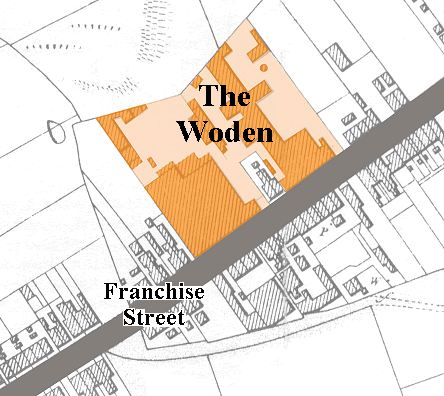
The factory in 1901. |
By 1914 the nut and bolt department
produced a wide range of nuts, bolts, set screws, studs, and
washers, in bright, and semi-bright finishes,
from one eighth of an inch to three inches in diameter, manufactured from solid steel bar.
They were supplied to all kinds of
industries including shipbuilding, electrical
engineering, vehicle manufacturing, cycle manufacturing,
and met Admiralty specifications.
The
steel department produced bright drawn, and boiled mild bars in
rounds, squares, and hexagons etc., including versions that
complied with Admiralty specifications, suitable for high speed
machining and case hardening.
|
The tool department made a wide
range of joiners' and engineers' tools including vices, cramps,
tube cutters and lifting jacks.
The foundry produced castings in
the best malleable, and grey iron for such applications as ship
building, electrical engineering, mechanical engineering,
vehicle manufacturing, cycle manufacturing, and tramways.
In 1916 the company took out another patent, this
time for improvements to screw nuts.
| View some images
from the 1924 Woden catalogue |
 |
|
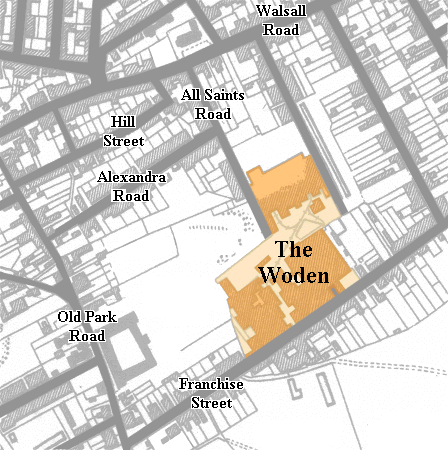
The factory in 1938. |
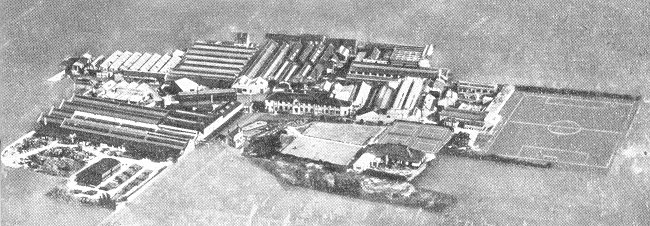
An aerial view of the factory from the 1952
tools catalogue.
|
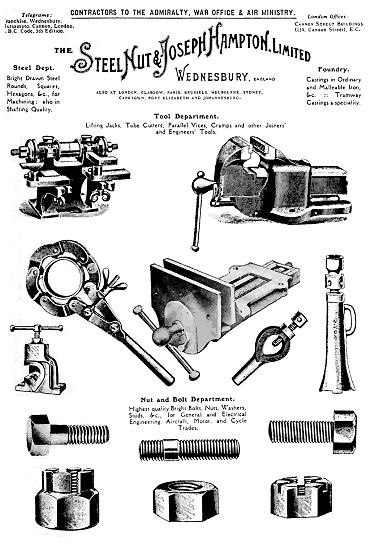
An advert from 1918. |
In 1937 patents were taken out for improvements
relating to vices, and the company had a stand at
the British Industries Fair held at Birmingham.
Products displayed included a wide range of nuts,
bolts, set screws, studs and washers; vices;
engineers', joiners, and pipe tools; sash and 'G'
cramps; bright-drawn, free-cutting steel shafting;
and a range of malleable grey iron and non-ferrous
castings.
It became a public company in 1938, and by that
time also produced bright drawn, free-cutting steel
shafting to Air Ministry and Admiralty specifications,
non ferrous castings, and introduced ebonising
as a protective finish. In 1939 at the outset of war, the company
concentrated on supplying products to the Admiralty,
the Air Ministry, the War Office, the aviation
industry, and produced heavy steel vices for many
manufacturers. After the war production returned to
normal, concentrating on nuts, bolts, and tools.
Parts of the factory were re-built and
modernised, and went into production in 1951. In the
same year a patent for improvements to quick release
vices was taken out, and in 1952 the firm took over
tool and hand plane manufacturer the W. S. Manufacturing
Company, at Quadrant Works, Sheepcote Street,
Birmingham. |
|
The following products are from the company's
1952 catalogue: |
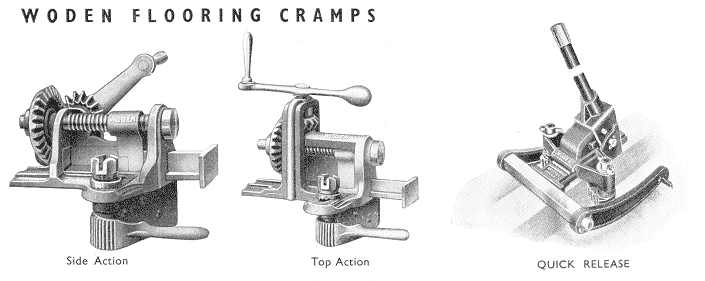
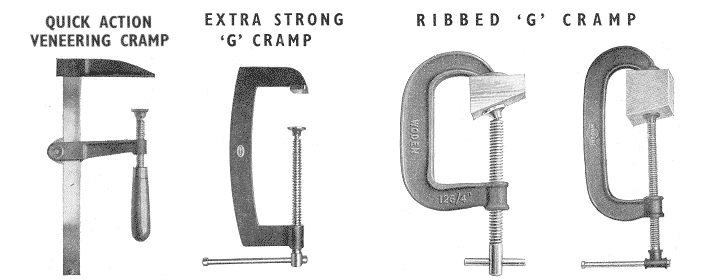
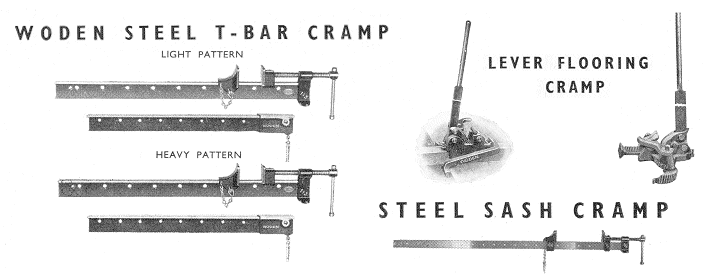
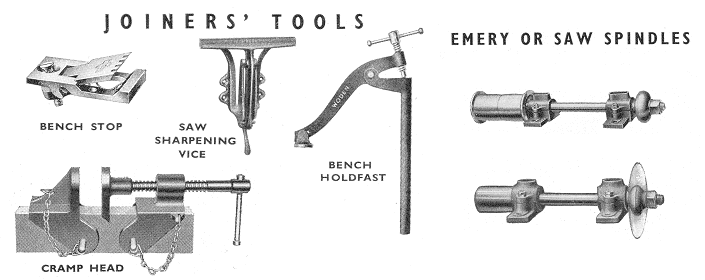
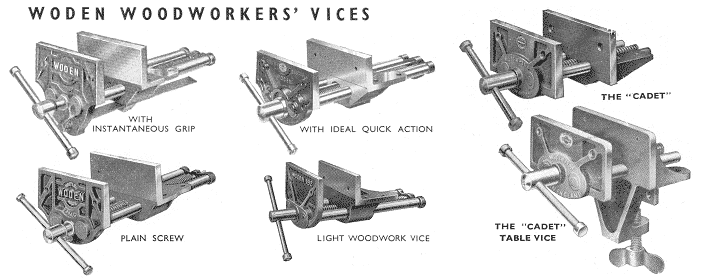
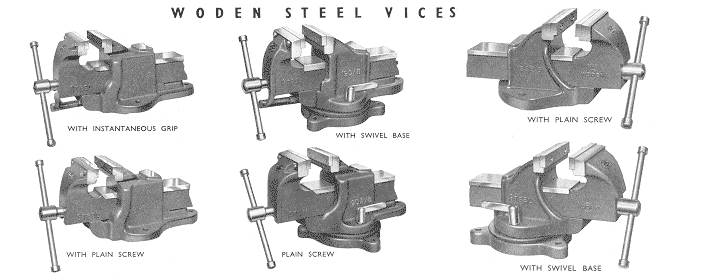
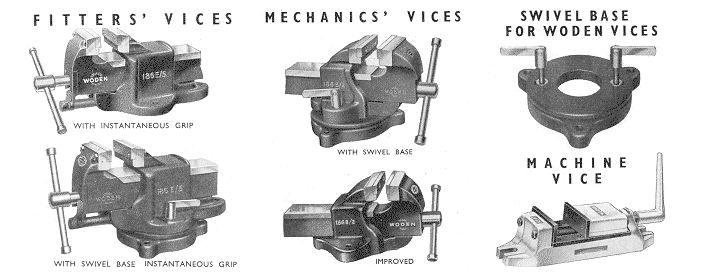
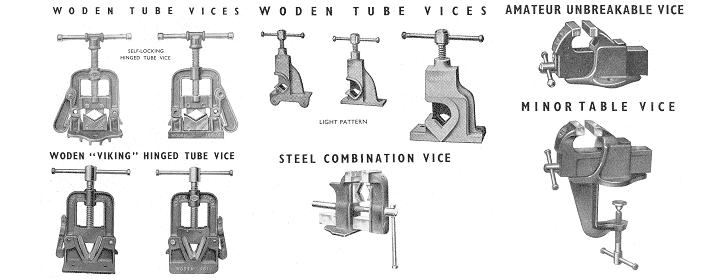
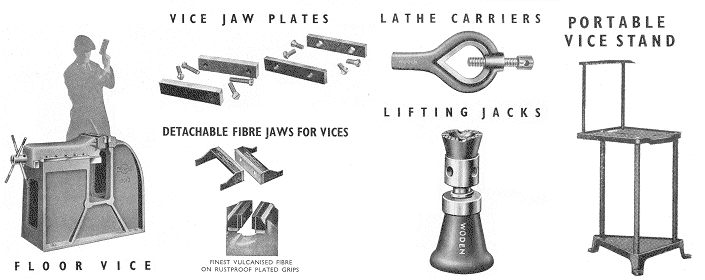
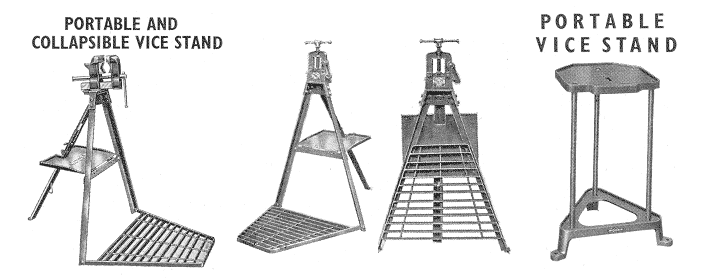
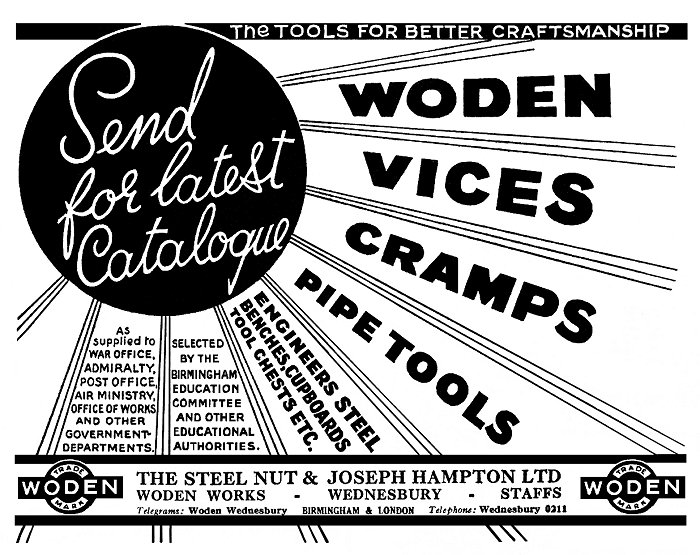
An advert from 1936.
|
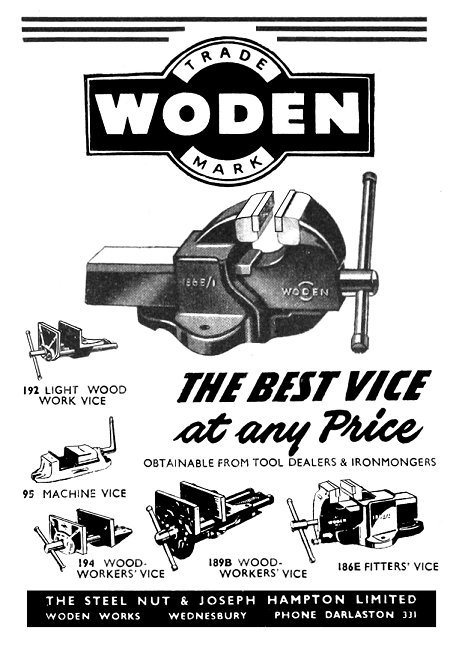
An advert from 1953. |
Woden planes appeared on the market in early 1954,
around 18 months after the acquisition of Birmingham
hand plane manufacturer W. S. Manufacturing Company. The
range, including bench planes, rebate planes, and block
planes was very successful, thanks to the growing demand
for hand tools.
In 1957 the company founded Woden
Tools Limited, which took over the manufacture and
distribution of the hand tool part of the business.
The
tools continued to be manufactured at Woden Works, and
many new products were added, and advertised in a
separate Woden Tools catalogue, which included tools
made by other manufacturers.
|
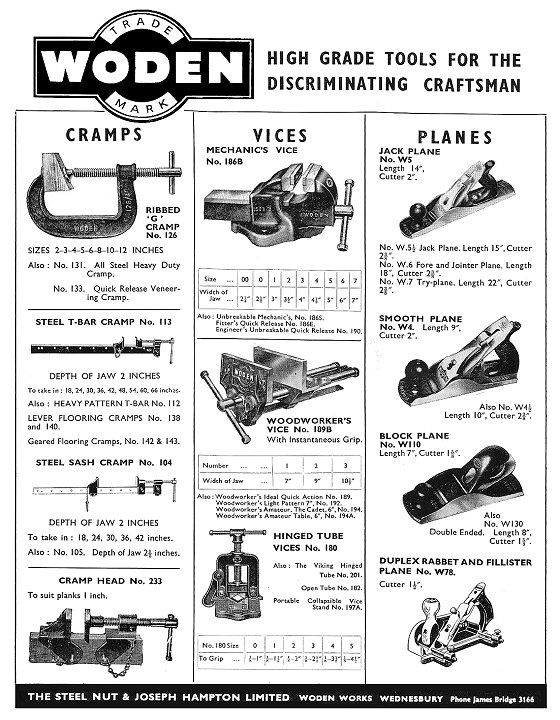
An advert from 1956.
|
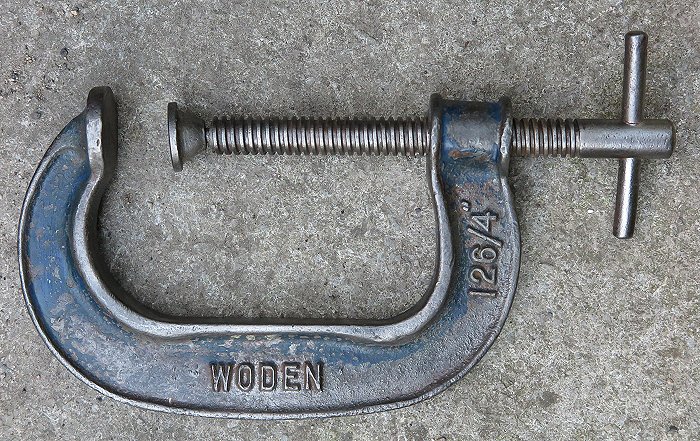
A 4 inch 'G' clamp. |
| Hand tool production continued at Woden Works until
early 1961 when Woden Tools Limited was taken over by
Record of Sheffield, which of course had been started by
two members of the Hampton family in 1898 and traded as C & J
Hampton Limited.
Production moved to Sheffield where
hand tools carrying the Woden name were produced until
the early 1970s. |
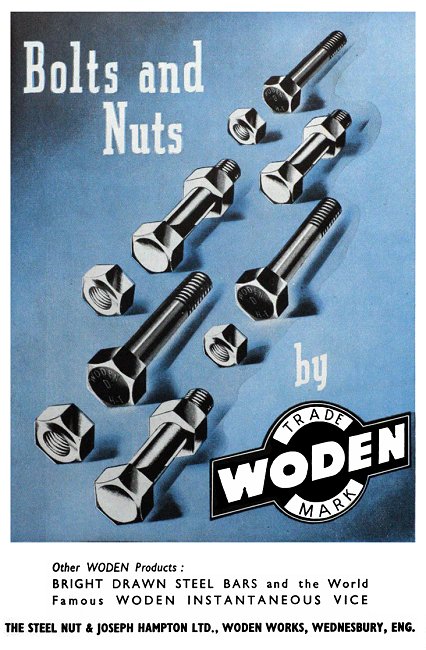
An advert from 1951. |
|

A letterhead from the mid
1950s. |
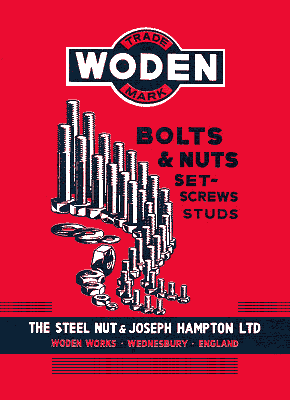 |
By 1961 The Steel Nut & Joseph Hampton
Limited had become one of the
larger local employers, employing 850 people. At the time the
nut and bolt department produced a wide range of products,
including the following:
Bright steel hexagon head set screws, or
bolts, with or without hexagon nuts, in lengths of three quarters
of an inch to six inches, and diameters of a quarter of an inch
to one inch.
Bright mild steel hexagon nuts in diameters
of three sixteenths of an inch to three quarters of an inch.
Also available as lock nuts, slotted nuts, or round top castle
nuts.
Bright steel engineers washers in diameters
of three sixteenths of an inch to five eights of an inch.
Bright mild steel studs in Whitworth or
B.S.F. threads, with diameters of three sixteenths of an inch to
one inch, and lengths of one inch to six inches.
|
| Other products included high tensile hexagon head bolts or set
screws in diameters of a quarter of an inch to half an inch, and
lengths of half an inch to four inches. High tensile bolts and set screws were also
available. They were made of medium carbon steel, and supplied
to engineering companies, particularly motor car and heavy
vehicle manufacturers. They were heat treated to withstand a
tensile strain of 45 to 55 tons per square inch.
The steel department produced a
range of bright drawn steel bars, as the raw
material for the nut and bolt department. In the
early 1960s the steel mill was extended, and became
one of the largest up-to-date plants in the country
for the production of bright steel bars.
They were made from
several different steels. Woden "XX" free cutting steel was
suitable for use in electrical fittings, car parts,
cycle parts, wireless and telephone equipment,
sparking plugs, screws, and many repetition parts.
It was available as rounds from three sixteenths of
an inch to three inches in diameter, hexagons
(across flats) from a quarter of an inch to two and
three quarters of an inch, and squares of a quarter
of an inch to two inches.
|
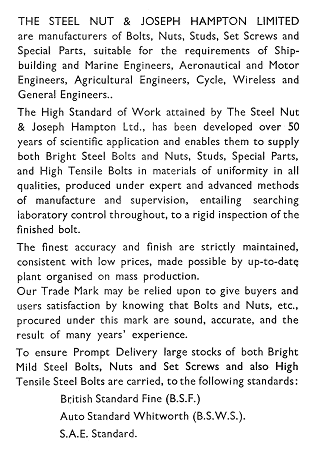
From an early 1960s catalogue. |
|
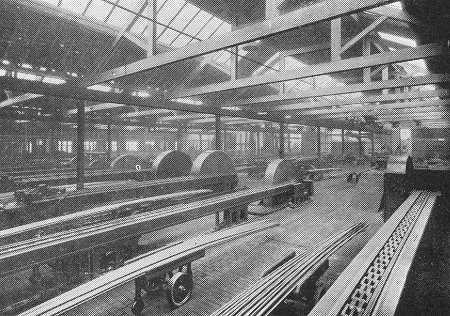
The steel department in the
1960s. |
The sections were available in lengths of 16 feet
(hexagons and squares), and up to 25 feet (rounds).
The same
products were also produced in Woden "HH" steel, a low carbon
mild steel, for general engineering purposes, and Woden "BB"
steel, a medium carbon steel, combining high tensile strength
with good elongation, and excellent machining properties.
The company also produced Woden shafting
steel, a bright drawn rolled bar, produced for overhead line
shafting. Steel bars were also produced to Air Ministry
specifications.
|
|
In 1965 the company was purchased by F. H. Tomkins, Limited. A
Walsall-based buckles and fasteners company.
The following year The Steel Nut & Joseph
Hampton Limited acquired steel stockholders Monkhouse and Brown,
which was sold to Hall Engineering (Dies) of Shrewsbury, in
1969.
In 1981 part of the company’s assets were
sold to Brasway, which was subsequently acquired by Essanbee
Products, a distributor of fasteners.
|
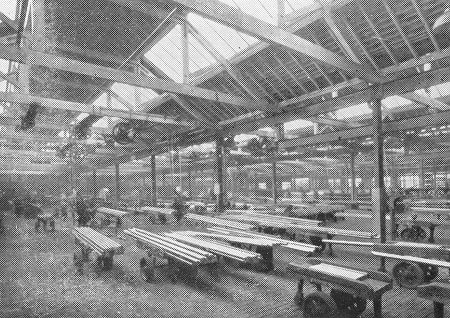
Another view of the steel
department in the 1960s. |
| After acquisition by Brasway, the Woden factory
specialised in a range of seamless steel and
stainless steel tubes. It became known as Brasway
Tube, and in the twelve months to 2nd May, 1992 made
a pre-tax profit of £182,000, but in the first six
months of the following financial year it lost
£157,000 and was put-up for sale. Much of the factory
was acquired by Corus and used as a steel warehouse. |
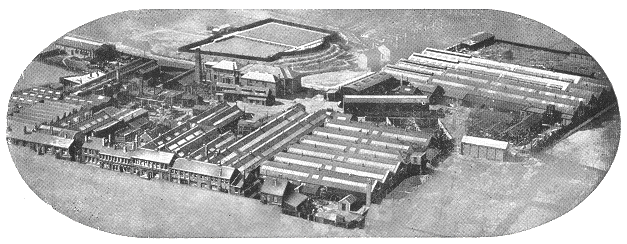
The factory in the 1960s.
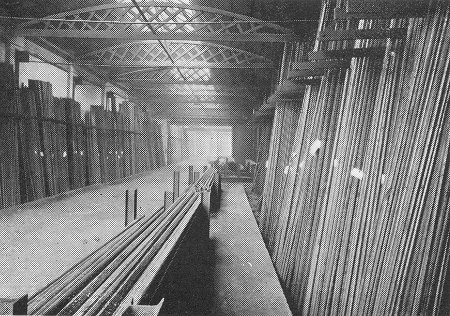 |
The steel store. |
|
The
laboratory.
|
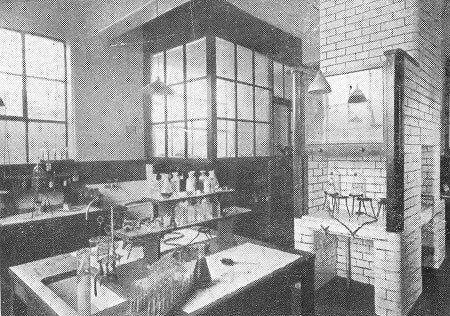 |
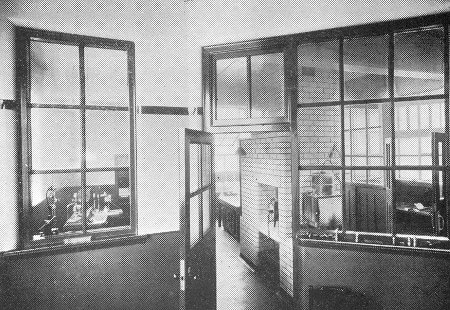 |
Another view of the
laboratory. |
|
The test
house.
|
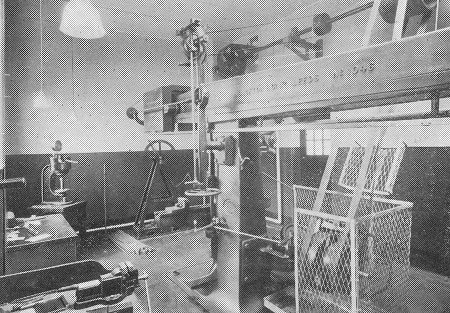 |
 |
Return to
the
previous page |
|